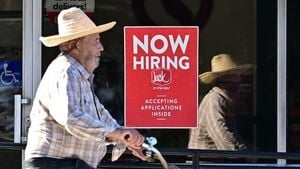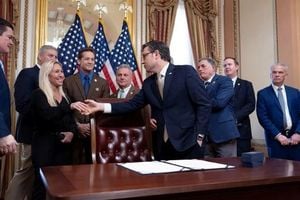Scotland’s trade union movement was rocked this weekend by the suspension of Derek Thomson, the Scottish secretary of Unite, the country’s largest trade union. The decision, announced on August 31, 2025, comes amid an internal investigation into historic allegations of sexual misconduct involving inappropriate behaviour towards a woman—a revelation that has sent shockwaves through both the union’s membership and the broader labor community.
Thomson, who has been Unite’s Scottish secretary since 2023, has long been regarded as a pivotal figure in Scottish industrial relations. According to BBC News, he has served as a key spokesperson for the union on major issues, most notably as an outspoken critic of both management and government officials over job protections at the Grangemouth refinery since late 2024. Unite Scotland, which represents about 150,000 workers across sectors such as energy, transport, manufacturing, and health and social care, confirmed that Thomson’s suspension is pending a full and proper investigation into the allegations, which reportedly date back several years.
The Sunday Mail first reported that the complaints against Thomson concern inappropriate behaviour towards a woman, and that these matters, though historic, have only recently resurfaced. Union sources emphasized to the Sunday Mail, “Clearly when you have allegations like this the union has no option but to suspend the employee involved and that is what has happened. There will be a full and proper investigation as is the right thing to do in the circumstances. This has to do with issues that have been raised a number of years ago but have now resurfaced.” The same sources insisted, “As ever, the general secretary Sharon Graham will be handling this fairly and by the book. It should be noted that Derek is innocent until proven otherwise.”
Thomson’s record as a union leader has been widely praised by supporters and members alike. “There are many members who will attest to the work he has done supporting people and fighting for better pay and conditions,” one source told the Sunday Mail. His leadership during the turbulent period surrounding the Grangemouth refinery closure near Edinburgh has been particularly noted, with many crediting his efforts for keeping the plight of workers in the national spotlight.
Yet Thomson’s suspension comes at a time of significant internal strife within Unite. As reported by BBC News and corroborated by The Telegraph, there is a bitter split in the union between allies of current general secretary Sharon Graham and those loyal to her predecessor, Len McCluskey. This infighting, which has manifested in allegations of bullying and harassment, has been exacerbated by a series of corruption scandals that have plagued the union in recent years. Despite this broader context, union insiders stressed to the Telegraph, “That is not to say this has anything to do with that and all allegations against anyone, no matter how senior, need to be treated with the same level of seriousness.”
Sharon Graham, who succeeded McCluskey in 2021, has made rooting out misconduct and corruption a central plank of her leadership. Under her direction, Unite has launched several high-profile probes into past dealings, most notably a major fraud investigation into the £112 million construction of a hotel in Birmingham owned by Unite. The hotel, now valued at just £29 million, has raised serious questions about an £83 million discrepancy. As detailed in the Sunday Mail and The Telegraph, Graham commissioned forensic accountants at Grant Thornton and several King’s Counsels to investigate both the hotel project and Unite’s “affiliated services wing,” which offers discounts to members on products such as mortgages and legal advice.
These investigations led to a dramatic police raid of Unite’s London headquarters in April 2022. While no charges have been brought so far, all reports generated by the internal and external probes have been passed to the police. The Telegraph reported that a July 2025 report found that McCluskey, during his tenure, had signed contracts for the Birmingham hotel overruling staff and legal advice, taken a private jet paid for by the hotel’s builder, and attended football matches with representatives of the same firm—who also paid for the tickets. McCluskey, however, has consistently denied any wrongdoing, arguing that decisions around the hotel contractors were made by the union’s former finance director, who died in 2020. The report was unable to confirm this assertion.
Unite’s leadership has been quick to assert that all complaints of inappropriate behaviour—historic or otherwise—are now taken extremely seriously. A Unite spokesperson told The Telegraph, “Whilst we cannot comment on individual cases, under the present leadership any complaints of inappropriate behaviour are taken extremely seriously and dealt with decisively. No stone will be left unturned to deal with any historic or current wrongdoing. This has been proven by the action taken to investigate historical allegations of corruption surrounding the Birmingham hotel. Under the current leadership the necessary action has and always will be taken.”
Thomson is considered a close ally of Graham, with the two working together in recent months to address issues like the threatened closure of the Grangemouth refinery—a campaign that has drawn national attention and highlighted the union’s role in defending workers’ interests. Yet, as the BBC and The Telegraph both note, the current investigation into Thomson is being handled independently and with the utmost seriousness, regardless of his position or alliances within the union.
Unite’s influence extends far beyond Scotland. As the largest union in the UK, it is also one of the Labour Party’s biggest donors, giving the unfolding events additional political resonance. The union represents workers across a vast swath of the economy, and its internal affairs often have ripple effects in both the political and industrial spheres.
The suspension of such a prominent figure as Derek Thomson inevitably raises questions about the wider culture within large unions and the processes they have in place to handle allegations of misconduct. Observers point out that the transparency and decisiveness with which Unite’s current leadership has approached both corruption and misconduct claims may mark a significant shift for the organization—a point underscored by the union’s willingness to commission external investigations and cooperate fully with law enforcement.
For now, Thomson’s future remains uncertain. The investigation is ongoing, and union officials have emphasized that he is “innocent until proven otherwise.” The situation has generated intense debate within the union’s ranks, with some members expressing shock and disappointment, while others see the suspension as evidence of the union’s renewed commitment to accountability, regardless of rank or reputation.
As the inquiry continues, Unite’s leadership faces the dual challenge of maintaining public trust and internal unity at a time when both are under strain. The outcome of the investigation—and the way it is handled—will likely have lasting implications not just for Thomson and Unite, but for the broader labor movement in Scotland and beyond.




